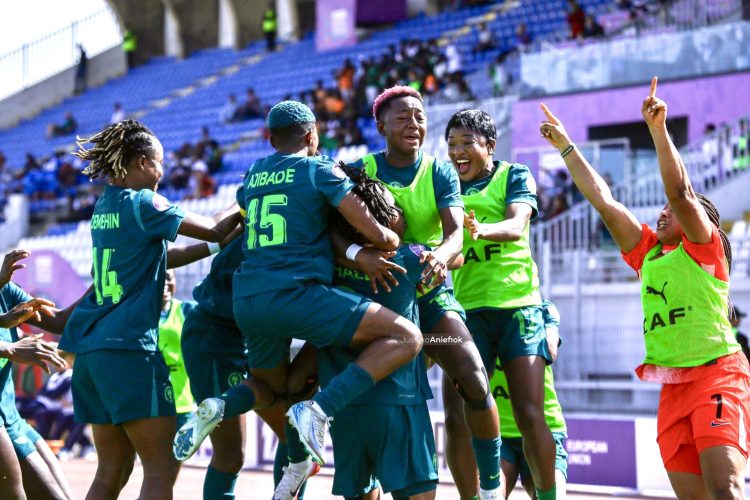Coach Justine Madugu has affirmed that Nigeria’s Super Falcons are fully focused on reclaiming the Women’s Africa Cup of Nations title as they prepare for Saturday’s final in Rabat.
The team, already nine-time champions, are aiming to extend their continental dominance at the 13th edition of the tournament.
Madugu expressed unwavering confidence in the squad’s commitment after their hard-fought 1-0 semifinal victory over reigning champions South Africa, decided by a breathtaking stoppage-time strike from defender Michelle Alozie.
“We thank God for making it to the final. I want to assure you that we are not going to relent or take our eyes off the ball. Our focus is on lifting the trophy in Rabat on Saturday,” Madugu said, as the Falcons departed Casablanca on Wednesday for the final leg of their Moroccan mission.
The Nigerian side, one of just seven nations to have competed in every FIFA Women’s World Cup since its inception in 1991, showcased tactical discipline and resilience to outlast Banyana Banyana, a result Madugu credited to strategic preparation.
“We knew South Africa, as Cup holders, would be difficult but we were ready for them. I am glad that our tactics paid off.
“As I said before the tournament, we will always assess the opposition first and then determine what tactics would suit us better and serve our purpose. We have done these in our previous five games and we will do the same in the final.”
Awaiting Nigeria in Saturday’s title decider is host nation Morocco, a rising force in African women’s football.
The clash at the Olympic Stadium in Rabat, scheduled for 9pm, is billed as the marquee showdown of the tournament, pitting the continent’s historic powerhouse against one of its fastest-rising challengers.
Interestingly, this will be the second time in less than two years that Nigeria will face a host country in a continental final, following the Super Eagles’ meeting with Côte d’Ivoire at the 2024 Africa Cup of Nations final in Abidjan. Just like then, South Africa served as the penultimate hurdle.
The Super Falcons’ charge has been powered by a blend of experience, flair, and youthful energy. Captain Rasheedat Ajibade has led by example, supported by the explosive runs of Folasade Ijamilusi, the attacking threat of Chinwendu Ihezuo, and the dynamism of Esther Okoronkwo and Jennifer Echegini.
Ashleigh Plumptre has offered attacking intent from the back, while goalkeeper Chiamaka Nnadozie, back-to-back African Goalkeeper of the Year, has been a near-impenetrable wall.
With 11 goals scored and only one conceded, a penalty by Linda Motlhalo in the semifinal, Nigeria have displayed dominance on both ends of the pitch.
Their journey from past triumphs to present-day ambition is rich in history. On October 17, 1998, the Falcons crushed Morocco’s Lionesses 8-0 in Kaduna during the inaugural tournament.
Nkiru Okosieme, Patience Avre, and Rita Nwadike each scored twice, while Mercy Akide and Florence Omagbemi added one apiece.
At the next edition in 2000, hosted by South Africa, Nigeria again swept Morocco aside 6-0, with Akide and Kikelomo Ajayi bagging braces.
But Morocco has come a long way since those heavy defeats. At the 2022 WAFCON, the North Africans eliminated the Falcons in a tense semifinal clash that ended 1-1 after extra time and was settled by penalties.
From struggling in the shadows to earning back-to-back final appearances, Morocco’s Lionesses have experienced a remarkable ascent.
Their current stature is a testament to the growth of the women’s game in the region.
Saturday’s final promises not just footballing drama but also a celebration of African women’s football, a packed Olympic Stadium and a chance to witness history in the making.
